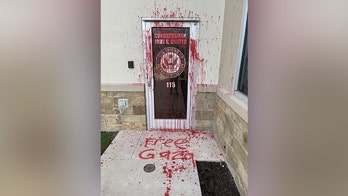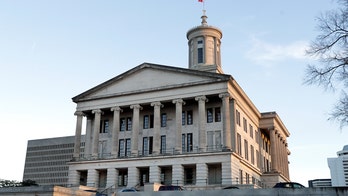Two weeks after President Obama signed the new health care bill, opposition to it remains strong. In addition, the president’s legislative victory did not help his job approval rating, which hit a new low in a Fox News poll released Thursday.
The poll also finds more voters would punish rather than reward incumbents who voted for the health care bill, and that the Democratic win did nothing to energize the party faithful for the midterms.
President Obama’s overall job approval rating dropped to a new low of 43 percent. Nearly half -- 48 percent -- disapprove. In mid-March, it was 46-48 percent. His current rating among Democrats (80 percent) and independents (38 percent) are among his lowest ratings with these groups. He is now in single digits among Republicans (7 percent). By comparison, former President George W. Bush’s approval among Democrats went as low as 4 percent.
The poll finds by a 54 to 39 percent margin, American voters oppose the new health care law. Just prior to the bill’s passage, 55 percent opposed, while 35 percent favored the overhaul.
Among the key group of independent voters, 38 percent favor the law and 55 percent oppose it. When voting this November, more than twice as many independents say they are less likely (39 percent) to vote for a candidate who favored the bill than say more likely (18 percent).
More than two-thirds of Democrats -- 69 percent -- like the new law. While nearly four times as many Democrats say they are more likely (39 percent) rather than less likely (10 percent) to vote for a candidate who favored the bill, nearly half say it will make no difference to their vote (49 percent). Almost all Republicans (91 percent) oppose the overhaul, and 70 percent say they are less likely to vote for someone who backed it.
Overall, 38 percent say they would be less likely to vote for a candidate who voted for the bill, while 22 percent say more likely. For another 38 percent it won’t make a difference. About a third of respondents (32 percent) say they don’t know how their Representative voted on health care.
Health care, however, isn’t the top issue to voters -- not by a long shot: 49 percent say the economy will be the most important issue in deciding their vote this year, while one in five says health care (21 percent).
Few voters like the new health care law in its current form. Only 12 percent think it should be implemented as is. Nearly half -- 47 percent -- think it needs to be changed, and 36 percent would repeal it all together.
“The fact that more than four of every five voters are unhappy with the new law as it stands is a testament to how difficult it may be for backers to sell their vote to constituents in the fall,” said Ernest Paicopolos, a principal at Opinion Dynamics.
The country is divided on the changes that will be made to the health care system under the law. While 21 percent think the changes don’t go far enough, twice as many -- 44 percent -- think the changes go too far. For another one in five the law includes about the right amount of change to the system (22 percent).
Voters split evenly on the big picture question of whether the law is good (45 percent) or bad (49 percent) for the country. There’s much more agreement on how the law will impact the nation’s debt. About three times as many think the law will push the country further into the red (65 percent) than think it will prevent the nation’s debt from growing (22 percent).
A majority -- 56 percent -- think their personal health care costs will increase under the new law. At the same time, by a 20 percentage point margin more people think the quality of their care will be worse (46 percent) rather than better (26 percent).
Voters are divided over whether they will have to change their coverage (42 percent) or not (48 percent) under the law. One in four people aren’t waiting to find out, and will visit their doctor or get a medical procedure done now -- specifically before the reforms take place.
A majority of voters think Speaker Pelosi and House Democrats changed the rules (54 percent) to get health care passed -- almost twice as many as think they played by the rules (29 percent).
Interest in this fall’s elections among Democratic voters continues to fall far below that of Republicans.
Since the law’s passage, the number of Democrats saying they are “extremely” or “very” interested in the elections remains unchanged at 50 percent, while a significantly larger number of Republicans -- 69 percent -- are at least very interested.
If the Congressional election were held today, 43 percent of voters say they would support the Republican candidate in their district and 39 percent the Democrat. That’s almost identical to last month when the Republican candidate had the edge by 42 to 38 percent.
On Obama’s handling of health care, 40 percent approve of the job he’s doing, up from 37 percent in late February. Fifty-three percent disapprove.
On the economy, 42 percent approve and 53 percent disapprove. He receives similar results on job creation: 40-54 percent.
The president’s highest approval ratings are on his handling of terrorism (50 percent) and Afghanistan (49 percent). His lowest marks are on the federal deficit: 31 percent approve and 62 percent disapprove.
For the job Congress is doing, 21 percent approve, while 72 percent disapprove. That’s a slight improvement from 18-76 percent the week before the health care vote (March 16-17).
Twenty-nine percent of voters have a positive view of House Speaker Nancy Pelosi, up from 24 percent in February. More than half -- 53 percent -- have a negative view. More than twice as many voters view Senate Majority Leader Harry Reid negatively as positively, though nearly half are unable to give an opinion. Even fewer voters are familiar with House Minority Leader John Boehner: 12 percent have a favorable view, 18 percent unfavorable, and 70 percent can’t rate the Ohio Republican.
The national telephone poll was conducted for Fox News by Opinion Dynamics Corp. among 900 registered voters from April 6 to April 7. For the total sample, the poll has a margin of sampling error of plus or minus 3 percentage points.
Other findings from the new poll:
• By 65 to 25 percent, voters support the United States taking military action to keep Iran from getting nuclear weapons. That includes majorities of Democrats (58 percent), Republicans (77 percent) and independents (60 percent).
• In general, most voters -- 70 percent -- favor increasing offshore drilling for oil and gas in U.S. coastal. When the question specifically mentions “President Obama’s plan to allow offshore drilling,” that increases to 73 percent. Among Democrats, 61 percent favor offshore drilling whether Obama is mentioned or not.
• Nearly equal numbers of voters have a favorable opinion of the Democratic Party (42 percent) and the Republican Party (40 percent), and almost as many view the Tea Party movement positively (36 percent). The poll finds independents give a slight edge to the Tea Party. Thirty-five percent have a favorable view of the movement, compared to 34 percent for the Republican Party and 31 percent the Democratic Party.
• Seven months before the midterm elections, 13 percent of voters feel “enthusiastic,” and 34 percent “satisfied” with the Obama administration. On the other end of the scale, 25 percent feel “dissatisfied” and 27 percent are “very upset.” For independents, 45 percent feel enthusiastic or satisfied and 53 percent dissatisfied or upset.
• When Vice President Joe Biden described how important he thought passage of the health care bill was, he used some pretty foul language. He whispered to the president, “This is a big [expletive deleted] deal.” Nearly 4 in 10 voters (37 percent) think his choice of words was offensive, but most -- 57 percent -- disagree.
• Compared to 10 years ago, many people (65 percent) say they hear foul language used more often these days. Even when watching a presidential bill signing.




